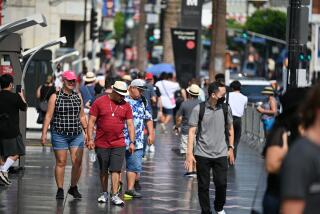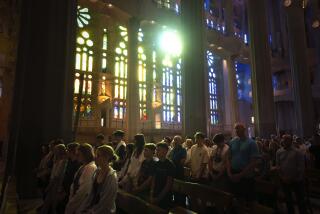MIDDLE EAST : Egypt Struggles to Regain Ancient Appeal to Tourists : Industry rebounding after slump caused by quake, violence. But some visitors are slow to return.
CAIRO — After avoiding Egypt en masse for two years, tourists are returning to this ancient land, giving the economy a needed boost and confounding Islamic militants who promised to destroy the country’s tourism industry.
Their return, though far below the peak levels of the early 1990s, comes after a desperate period in which security concerns led to the collapse of the industry just as U.S. travel agents were preparing to showcase Cairo as one of the world’s favored destinations.
The near-miss came in September, 1992, when 7,000 members of the American Society of Travel Agents--the world’s largest and most influential travel association--gathered here for their annual convention. Despite skepticism over this crowded, chaotic city’s ability to handle such a large delegation, the conference came off without a logistics hitch. The presence of an ASTA convention often results in a 25% increase in tourism for the host country within two years.
Egyptian officials feted ASTA with lavish cruises on the Nile and opulent banquets.
Three weeks after the conference, Cairo was struck by an earthquake that toppled numerous apartment buildings. Within days, Islamic militants fighting the government warned foreigners to stay clear of Egypt. The first of eight tourists to be killed between 1992 and 1994 was shot, and gunmen in southern Egypt opened fire on a tourist boat cruising the Nile. Several prominent Egyptians were attacked in Cairo as infidels.
Tourism--Egypt’s largest source of foreign exchange after remittances sent home by Egyptians working in other Arab countries--disappeared. Two-hundred-passenger cruise ships plied the Nile with 10 or 12 guests, the seven Hilton hotels and four Sheratons echoed with only an occasional footstep. Occupancy in some hotels fell below 20%. Tourism revenues tumbled from $2.3 billion in 1992 to $1.4 billion in 1994.
“I don’t want to use the word sensationalize, but the media did vastly overestimate the threat,” said Yaap Englesman, sales and marketing director for the 1,250-room Cairo Marriott Hotel and Casino, the Middle East’s largest hotel. “Tourists were afraid, but if you used common sense about where you went and what you did--just as you’d do in Miami or New Delhi or anywhere--the threat was . . . minimal.”
To keep the industry afloat, Egypt began catering to conferences--one of the conventions it hosted was the U.N. Crime Prevention Conference--and offered low-cost packages aimed at budget-minded Europeans. The result, many complained, was that the traditional upscale tourists who came to discover Egypt’s wondrous past were replaced by a group that cared little about history and had few interests other than getting a suntan at one of the Red Sea resorts.
The irony was that Cairo is among the safest cities in the world. Muggings, robberies and assaults are rare here, and a visitor can walk alone down the darkest street at night without fear. On top of that, Egyptians treat Westerners with a cordiality that startles many first-time visitors.
However, this week the U.S. Embassy issued a fresh warning to Americans to be on their guard, after it received threats against American interests, an embassy spokesman said.
Tourism’s revival--arrivals are up 25% this year, and hotel occupancy has risen from 42% to 58%--is the result of a $17-million advertising campaign conveying the message of safety and of the government’s harsh crackdown on militants that has contained their violence to an area about 200 miles south of Cairo.
*
But Egyptian tourism still faces an uphill battle. Americans have been slow to return, and Arabs--who make up 10% of visitors--are rediscovering Beirut. Additionally, the public whipping in Saudi Arabia of an Egyptian doctor who said his son was sexually molested by a Saudi headmaster has led to a dispute between Riyadh and Cairo. As an apparent result, Saudis who usually swarm to Cairo and Alexandria in the summer have been mostly absent this year.
(BEGIN TEXT OF INFOBOX / INFOGRAPHIC)
On the Rebound
Egyptian tourism appears to be steadily rising after dropping dramatically after 1993. An earthquake and fears of violence drove visitors away.
Tourist Revenue
1995*: $1.5 billion
Number of Visitors
1995*: 2.7 million
* Projections
Sources: Egyptian Central Bank, Egyptian Tourist Authority
More to Read
Sign up for The Wild
We’ll help you find the best places to hike, bike and run, as well as the perfect silent spots for meditation and yoga.
You may occasionally receive promotional content from the Los Angeles Times.






